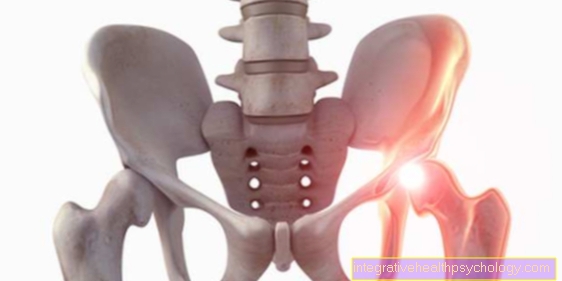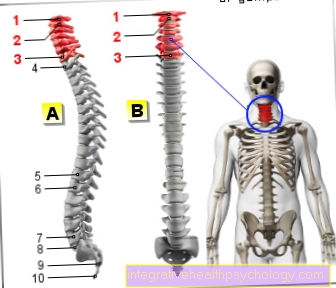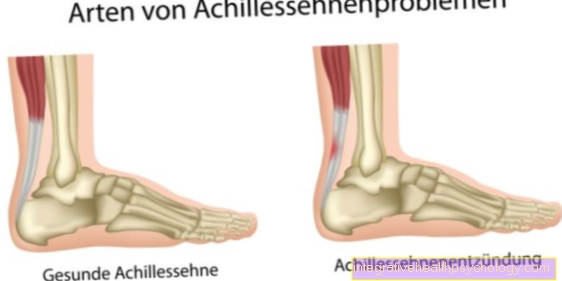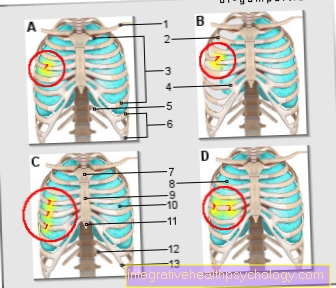Termination of pregnancy
Synonyms
Abortion, abortion, abortion, interruption
English: abortion
Medical : abort
definition
Termination of pregnancy is understood to be the deliberate termination of a pregnancy that is medically or instrumentally / surgically brought about, with the accompanying abortion of the child.
Global situation

According to WHO estimates (WHO = World Health Organization), around 30% of all pregnancies worldwide are unwanted. 20% of all pregnant women get one Termination of pregnancy - half of it illegally.
The legal situation is very different from country to country. In particular, the prevailing religion and awareness of tradition, conservatism and the image of women have a very strong influence on people's attitudes towards abortion. A strict regulation can lead to women turning to illegally working, less competent staff. It is not uncommon for them to lead to serious complications and a fatal outcome Termination of pregnancy - Around 70,000 women die every year as a result. In general, the subdivision into time limits and indication regulations has become established in some countries.
In the Deadline regulation is a Termination of pregnancy up to a certain point in time of pregnancy (usually up to the 12th week post conceptionem, i.e. after conception) without justification.
The Indication regulation on the other hand, although it does not restrict the possible termination date, it does require a valid reason for an abortion.
German law

The legal situation in Germany was in 1995 §218 and §219 StGB abortion regulated. After that is a Termination of pregnancy/ Abortion according to the indication regulation under certain conditions unpunished. These include:
- Indication according to the advisory model
- The pregnancy must not exceed 12 weeks (after conception) be advanced (corresponds to the deadline regulation).
- The pregnant woman must have visited a recognized pregnancy conflict counseling center at least 3 days before the abortion and be able to present a written confirmation of this conflict counseling.
- The doctor carrying out the procedure is not allowed to give the advice himself.
- If the pregnant woman is in particular distress and can provide written evidence of counseling from a recognized conflict counseling center for pregnant women, in special cases an abortion up to the 22nd week of pregnancy remains unpunished.
- Medical indication
This is the case if physical or mental Damage to the pregnant woman by the Termination of pregnancy, according to medical opinion, are preventable. These include, for example, severe disabilities or malformations in the child. There is neither a time limit nor an obligation to provide advice. In this case, the costs are borne by the health insurance company.
- Criminological indication
Is the pregnancy caused by an unlawful act (e.g. rape) and has not progressed more than 12 weeks after conception, the termination remains unpunished. Here, too, the costs are covered by the health insurance company.
The basic requirement in any case is the express wish of the pregnant woman for one abortion.
Furthermore, the doctor, as the only person authorized to have an abortion, must always explain possible complications and, if advisory or criminological indications, check the age of the pregnancy. He alone assesses whether there is a medical or criminological indication.
Note: termination of pregnancy
No doctor is obliged to terminate the pregnancy, unless there is a medical emergency with a life-threatening condition for the pregnant woman.
If the pregnancy is so advanced that the child is able to survive outside the womb, it must be given a fetocide before the abortion (drug to kill the fetus) can be administered.
Even the attempt to have an abortion contrary to the above-mentioned conditions is punishable - but not if it was carried out by the pregnant woman herself. If the unlawful abortion succeeds, the perpetrator faces 3 years imprisonment or a fine. In particularly serious cases (abortion against the will of the pregnant woman or accepting damage to health or death) there is a risk of up to 5 years imprisonment. If the pregnant woman carries out the act herself, she has to expect a prison sentence of 1 year or a fine.
Procedure for termination of pregnancy
In general, there are two methods to choose from: surgical, instrumental and medicinal treatment, which are used depending on the indication and the progress of the pregnancy.
- Operative instrumental:
(1) curettage
Up to the 12th week of pregnancy after conception, scraping is suitable (curettage). First, the cervix is pre-stretched in order to minimize the risk of injury. In general or local anesthesia, the vagina and the cervix the instruments introduced and the content of the uterus scraped off.
(2) vacuum aspiration
This process is basically a scraping with negative pressure - and should therefore only be carried out until the 12th week of pregnancy. Here, too, the cervix is pre-stretched, after which the contents of the uterus are suctioned off with a blunt device.
Both scraping and vacuum aspiration can be performed on an outpatient basis, as they have a low risk profile. You may then have slight abdominal cramps.
(3) hysterectomy / hysterotomy
If there are also benign uterine tumors (e.g. Myoma) or a cervical cancer, the uterus is usually removed through an incision in the abdomen or through the vagina (hysterectomy).
- Medicinal:
(1) In early pregnancy:
Up to the 35th day or up to the 5th week of pregnancy after conception, it is possible to administer antihormones, more precisely antigestagens (Mifegyne = RU 486 = "Abortion pill"). The pregnant woman is given a dose of mifepristone, which opens the cervix. Approx. Forty-eight hours later, progestins in the form of misoprostol should be taken, which cause the uterus to contract and the fruit to be expelled. Therapy is always carried out under medical supervision. Approx.A follow-up examination should be carried out 1 to 2 weeks after expulsion.
The success rate with this method is very high. Since 2007 it has been allowed in the EU up to the 9th week of pregnancy. However, this therapy should not be used in women with a fallopian tube or ectopic pregnancy (see also Pregnancy complications) as well as in asthmatics (see asthma) and women with spiral are used.
(2) In late pregnancy:
If the pregnancy is so advanced that scraping or hormone therapy is no longer suitable, a Miscarriage (Abortion) be initiated. As already described, it is compulsory to give the fetus a try beforehand Fetocide to kill. This is usually achieved with an injection of potassium chloride, which is done in the fetus Cardiac arrest leads. Another method is to cut off the blood supply through the umbilical cord.
Then with prostaglandins the birth or the Labor pains initiated. The previous gift of the antigestagens Mifegyne facilitates the process of expulsion by opening the cervix. The drugs can be given as an infusion, intramuscularly, or directly into the cervix.
The application of the "Morning-after pill“Is not considered to be an abortion as it takes effect before implantation. It is a pure progestin preparation and should be taken 24 to 48 hours after unprotected sex, at most 72 hours. By administering the drug twice, with an interval of 12 hours, hormone withdrawal bleeding is triggered and the fetus prevented.
Abortion complications

As already described above, dangerous complications occur especially in countries where the women concerned are forced by strict regulations to have illegal abortions performed. The risk is particularly high because the staff involved are often not very competent and the methods are dubious.
Of course, complications can arise even under perfect conditions. In general, the more advanced the pregnancy, the higher the risk. The main complications are:
- Mucous membrane and uterine injuries during scraping
- Bleeding and infections
- Persistent pelvic pain
- Psychological problems (feelings of guilt, depression)
The probability one Premature birth to suffer is in women after one Termination of pregnancy increased by approx. 10%, in women with multiple terminations by up to 30% (the cause here is suspected to be injuries and thus reduced resistance of the cervix and uterus).
Fertility is through one Termination of pregnancy, contrary to all rumors, not affected.
When it comes to psychological problems, it should be borne in mind that carrying an unwanted pregnancy to term can lead to massive problems and a conflict-ridden mother-child relationship.





























